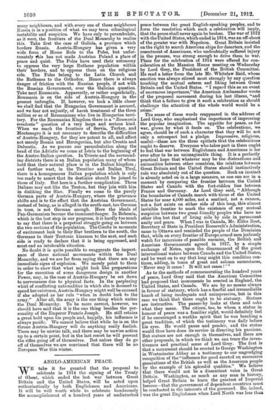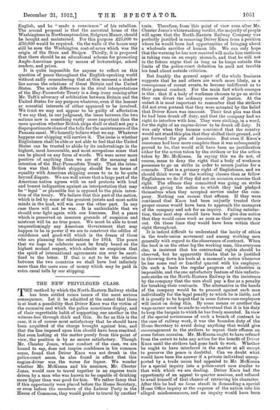ANGLO-AMERICAN PEACE.
WE take it for granted that the proposal to celebrate in 1914 the signing of the Treaty of Ghent, which ended the last war between Great Britain and the United States, will be acted upon enthusiastically by both Englishmen and Americans. It will be well worth while to celebrate handsomely the accomplishment of a hundred years of undisturbed peace between the great English-speaking peoples, and to form the resolution which such a celebration will imply, that the peace shall never again be broken. The war of 1812 with theUnited States, which ended in 1814, was an off-shoot of the greater war with Napoleon. Great Britain insisted on the right to search American ships for deserters, and the resentment of Americans, who undoubtedly suffered injury in the process, was strong enough to drive them to war. Plans for the celebration of 1914 were offered for con- sideration at the Mansion House meeting on Wednesday by Lord Grey, the President of the British Committee. He read a letter from the late Mr. Whitelaw Reid, whose emotion was always stirred most strongly by any question touching the mutual esteem and liking between Great Britain and the United States. " I regard this as an event of enormous importance," the American Ambassador wrote of the proposed movement during his last illness, "and think that a failure to give it such a celebration as should challenge the attention of the whole world would be a crime."
The sense of these words reappeared in the address of Lord Grey, who emphasized the importance of impressing the popular imagination. The appetite for peace, as for war, grows by what it feeds on. The celebrations, we agree, should be of such a character that they will be not only a retrospect but a pledge. Impressive, religious, useful—these are the three epithets that the celebrations ought to deserve. Everyone who takes part in them ought to feel that war between Englishmen and Americans is for ever after to be an unimaginable thing. It is a perfectly practical hope that whatever may be the distractions and animosities between other countries, the relations between Great Britain and the United States should instinctively rule war absolutely out of the question. Such an instinct is already acted on in a large measure, as one can see in a moment by comparing the frontier between the United States and Canada with the fort-ridden line between France and Germany. As Lord Grey said, " Although the boundaries of Canada march with those of the United States for near 4,000 miles, not a sentinel, not a cannon, not a fort exists on either side of this long, this almost invisible frontier to mark the existence of any mutual suspicion between two great friendly peoples who have no other idea but that of living side by side in permanent amity and peace. When I was in Canada, Mr. Elihu Root, Secretary of State in President Roosevelt's Administration, came to Ottawa and reminded the people of the Dominion that, while on every frontier of Europe armed men jealously watch for incursions of possible enemies, the British and American Governments agreed in 1817, by a simple exchange of Notes, upon the disarmament of the great international waters between Canada and the United States, and be went on to say that long might this condition con- tinue, adding, in tones of great and solemn earnestness, 'Never may it cease ! It will not cease ! ' " As to the methods of commemorating the hundred years of peace, Lord Grey said that the American Committee had proposed that monuments be erected in England, the United States, and Canada. We are by no means always in favour of statuary, which has a fearful and irremediable knack of being inadequate and unimpressive, but in this case we think that there ought to be statuary. Statues are instructive. The passer-by looks at them and asks what they mean. The citizen, too, to whom a statue in. honour of peace was a familiar sight, would definitely feel if he encouraged a warlike spirit that he was breaking a great tradition, of which the testimony was daily before his eyes. He would pause and ponder, and the statue would thus have done its service in directing his passions. But statues are not enough in themselves, and there are other proposals, in which we think we can trace the inven- tiveness and practical sense of Lord Grey. The first is that a monument should be erected to George Washington in Westminster Abbey as a testimony to our ungrudging recognition of the "influence for good exerted on successive generations of the British as well as the American people by the example of his splendid qualities." We believe that there would not be a dissentient voice in Great Britain. Washington, as much as any man in history, helped Great Britain to learn the greatest of Imperial lessons—that the government of dependent countries must be conducted in the interests of the governed. He, indeed, was the great Englishman when Lord North was less than English, and he " made a conscience " of his rebellion. The second proposal is that the ancestral home of the Washingtons in Northamptonshire, Sulgrave Manor, should be bought and maintained. For this purpose £25,000 to £30,000 would be required. On the walls of the house may still be seen the Washington coat-of-arms which was the origin of the Stars and Stripes. Thirdly, it is proposed that there should be an educational scheme for promoting Anglo-American peace by means of lectureships, school readers, and prizes.
It is quite impossible for anyone to reflect on this question of peace throughout the English-speaking world without sadly remembering that at this moment a shadow lies across the relations of Great Britain and the United States. The acute difference in the rival interpretations of the Hay-Pauncefote Treaty is a deep irony coming after Mr. Taft's advocacy of arbitration between Britain and the United States for any purpose whatever, even if the honour or essential interests of either appeared to be involved. We trust we may not appear to be guilty of affectation :f we say that, in our judgment, the issue between the two nations now is something vastly more important than the mere question whether British ships shall or shall not pay a disproportionate share of the tolls for the maintenance of the Panama canal. We honestly believe what we say. Whatever happens our shipping will survive it. The issue is whether Englishmen shall be able or not able to feel that the United States can be trusted to abide by its undertakings in the highest, most honourable, and most scrupulous sense that can be placed on any form of words. We were never more positive of anything than we are of the meaning and intention of the Hay-Pauncefote Treaty. That the inten- tion was that British shipping should be on terms of equality with American shipping seems to us to be quite beyond dispute. We are well aware that a large part of the American nation agrees with us and protests with loud and honest indignation against an interpretation that may be " legal " or plausible but is opposed to the plain inten- tion of the treaty. We believe that this part of the nation, which is led by some of the greatest jurists and most noble minds in the land, will win over the other part. In any case there will not be war. It is unthinkable that we should ever fight again with our kinsmen. But a peace which is preserved on insecure grounds of suspicion and mistrust will be no true peace. We must be able to trust unquestioningly any American Government that may happen to be in power if we are to construct the edifice of confidence and good-will which is the dream of those who are planning the celebrations for 1914. The peace that we hope to celebrate must be firmly based on the highest mutual respect, which admits no suspicion that the spirit of international agreements can ever be sacri- ficed to the letter. If that is not to be the relation between the two countries we shall have lost infinitely more than the mere sum of money which may be paid in extra canal tolls by our shipping.











































 Previous page
Previous page